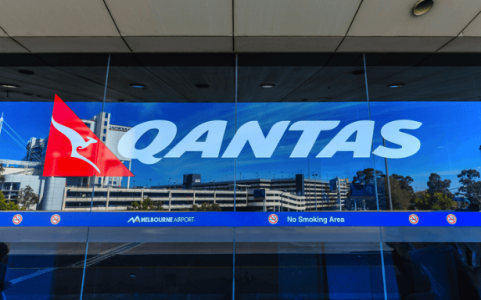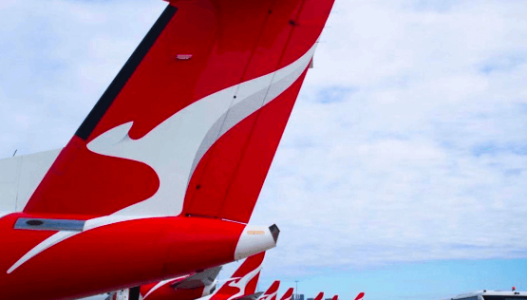Are Qantas frequent flyer points really worth it? Here's what customers are saying
- Replies 4
Qantas has come under fire recently as frustrated customers complain its frequent flyer program is a 'big scam' that tricks members into accumulating points that are impossible to use.
A senate inquiry into bilateral air service agreements received dozens of angry submissions from Qantas Frequent Flyer members outraged at ongoing point devaluation.
Point devaluation refers to airlines increasing the number of points required for seat bookings without notice, effectively making points less valuable.
One passenger with a whopping 1.6 million points said they spend 'hours—daytime and nighttime, weekdays and weekends—trying to book seats for overseas flights', but to no avail.
They described the program as 'a big scam, a big con job' that dupes members into earning 'points that you'll never be able to use'.

Others used words like 'diabolical', 'rip off', and 'a complete gouge' to vent their frustration.
One couple explained they previously got business class return flights to Scotland for 430,000 points in 2017. But the same trip now costs them 650,000 points plus a hefty $16,500 fee.
One retiree member even accumulated 800,000 points over a decade, hoping to fund a first-class journey with his wife. But ongoing devaluation meant the dream trip never happened—and probably never will.
Why so much outrage?
Frequent flyer programs are big business for airlines like Qantas, with around 15 million members in its program alone.
Members earn points through flying, credit cards and other purchases in the hope of redeeming for 'free' flights and upgrades. Airbnb, taxis, hotels—almost everything can rack up points towards the coveted 'free' airline seat.
But constant point devaluation means customers need more and more points for the same flight.
In one instance, a Frequent Flyer member said they used to fly to Bali for around 40,000 points prior to the pandemic. But now, it sets them back 167,000 points just for one trip.
'I thought I would have at least three trips for my points value,' they said.
How does point devaluation work?
When you earn frequent flyer points, the airline essentially sells you a currency they control. Earn enough points, and you can redeem points for flights without paying cash. But airlines can tweak required points without notice, especially for prime routes and peak seasons.
For example, Qantas might suddenly increase overseas flights in summer from 50,000 points to 120,000 points. Your points don't buy nearly as much flight time.
The value of points earned years ago is hit especially hard. You might've earned points with one set of requirements, just for the airline to later shift the goalposts.
While airlines say extra points are needed due to 'high demand'. But they control capacity and pricing. Devaluation lets them reduce reward seat availability to cut costs.
Qantas Loyalty CEO Olivia Wirth responded by requesting customer contacts to address complaints directly. She stated that 175 billion points were earned by members, while 155 billion were redeemed in the last year.
'Our program is successful only because members see value in earning and using points,' she wrote. Ms Wirth also said there were currently over five million reward seats available system-wide.
On claims of point requirement increases, she suggested customers were comparing reward seats and 'Points Plus Pay' options incorrectly. She said Classic Reward seats were rarely changed.
But the airline's loyalty reward members dispute this, arguing devaluation means the dream holiday for a certain amount of points is now unattainable.

This comes after it was reported that Qantas is removing expiry dates on unclaimed flight credits by the end of the year.
Customers holding Qantas flight credits will now have the option to claim a cash refund at any time. However, they are restricted to using these credits exclusively for flight bookings until the year's end 'due to a system limitation'.
On the other hand, customers with Jetstar credits will not have the option to opt for a cash refund. Instead, they will enjoy the flexibility to employ these credits for booking new flights 'indefinitely'.
Read the full article here.

Members, what are your thoughts on this news? Are you a Frequent Flyer? If so, do you find their points convenient and easy to use? Share your experiences with us in the comments below.
A senate inquiry into bilateral air service agreements received dozens of angry submissions from Qantas Frequent Flyer members outraged at ongoing point devaluation.
Point devaluation refers to airlines increasing the number of points required for seat bookings without notice, effectively making points less valuable.
One passenger with a whopping 1.6 million points said they spend 'hours—daytime and nighttime, weekdays and weekends—trying to book seats for overseas flights', but to no avail.
They described the program as 'a big scam, a big con job' that dupes members into earning 'points that you'll never be able to use'.

Qantas customers have slammed the airline's frequent flyer program as 'a big scam'. Credit: Shutterstock.
Others used words like 'diabolical', 'rip off', and 'a complete gouge' to vent their frustration.
One couple explained they previously got business class return flights to Scotland for 430,000 points in 2017. But the same trip now costs them 650,000 points plus a hefty $16,500 fee.
One retiree member even accumulated 800,000 points over a decade, hoping to fund a first-class journey with his wife. But ongoing devaluation meant the dream trip never happened—and probably never will.
Why so much outrage?
Frequent flyer programs are big business for airlines like Qantas, with around 15 million members in its program alone.
Members earn points through flying, credit cards and other purchases in the hope of redeeming for 'free' flights and upgrades. Airbnb, taxis, hotels—almost everything can rack up points towards the coveted 'free' airline seat.
But constant point devaluation means customers need more and more points for the same flight.
In one instance, a Frequent Flyer member said they used to fly to Bali for around 40,000 points prior to the pandemic. But now, it sets them back 167,000 points just for one trip.
'I thought I would have at least three trips for my points value,' they said.
How does point devaluation work?
When you earn frequent flyer points, the airline essentially sells you a currency they control. Earn enough points, and you can redeem points for flights without paying cash. But airlines can tweak required points without notice, especially for prime routes and peak seasons.
For example, Qantas might suddenly increase overseas flights in summer from 50,000 points to 120,000 points. Your points don't buy nearly as much flight time.
The value of points earned years ago is hit especially hard. You might've earned points with one set of requirements, just for the airline to later shift the goalposts.
While airlines say extra points are needed due to 'high demand'. But they control capacity and pricing. Devaluation lets them reduce reward seat availability to cut costs.
Qantas Loyalty CEO Olivia Wirth responded by requesting customer contacts to address complaints directly. She stated that 175 billion points were earned by members, while 155 billion were redeemed in the last year.
'Our program is successful only because members see value in earning and using points,' she wrote. Ms Wirth also said there were currently over five million reward seats available system-wide.
On claims of point requirement increases, she suggested customers were comparing reward seats and 'Points Plus Pay' options incorrectly. She said Classic Reward seats were rarely changed.
But the airline's loyalty reward members dispute this, arguing devaluation means the dream holiday for a certain amount of points is now unattainable.

Many who made submissions about Qantas were furious about how hard it was to obtain a rewards seat. Credit: Instagram/heavier.than.air.
This comes after it was reported that Qantas is removing expiry dates on unclaimed flight credits by the end of the year.
Customers holding Qantas flight credits will now have the option to claim a cash refund at any time. However, they are restricted to using these credits exclusively for flight bookings until the year's end 'due to a system limitation'.
On the other hand, customers with Jetstar credits will not have the option to opt for a cash refund. Instead, they will enjoy the flexibility to employ these credits for booking new flights 'indefinitely'.
Read the full article here.
Key Takeaways
- Qantas Frequent Flyer members have voiced their anger at the airline's rewards program, describing it as 'a big scam', 'a complete gouge', and a 'rip off'.
- The disgruntled customers took part in a senate inquiry, complaining about the devaluation of points and difficulties in finding a rewards seat to book.
- Some customers have said they've accrued thousands of points but are unable to use them for overseas flights.
- In response, Qantas Loyalty Chief Executive Olivia Wirth assured that there were more than five million Classic Flight Reward seats available for booking across the Qantas system.
Members, what are your thoughts on this news? Are you a Frequent Flyer? If so, do you find their points convenient and easy to use? Share your experiences with us in the comments below.







